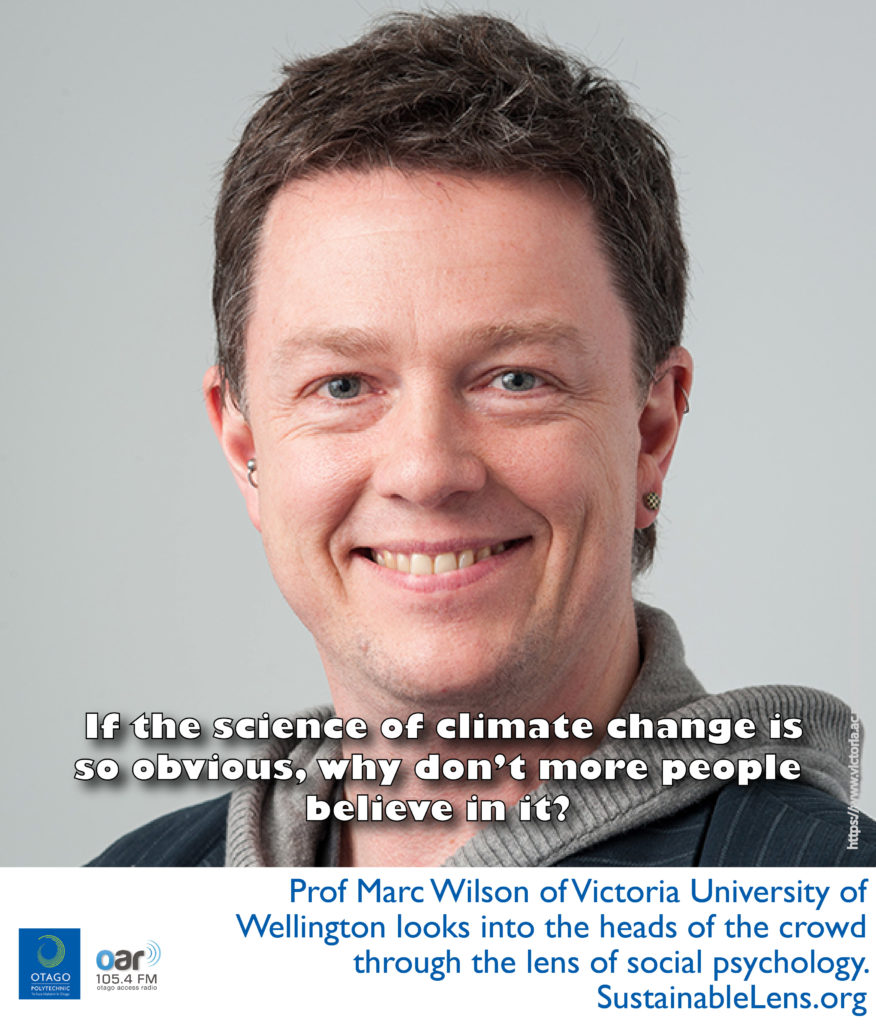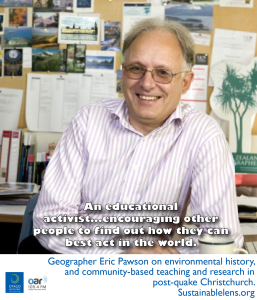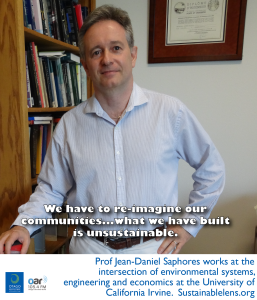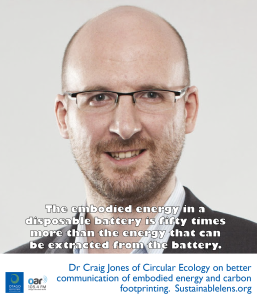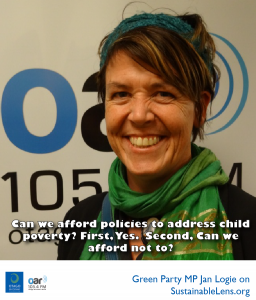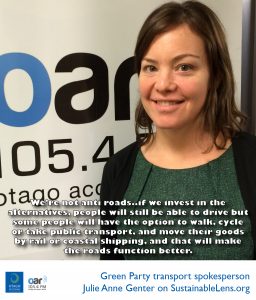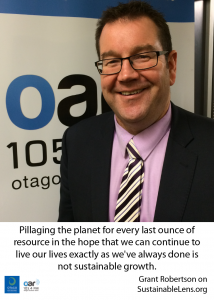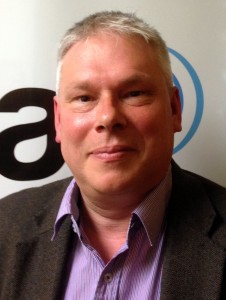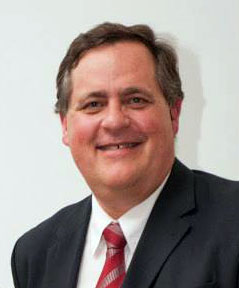
Nathan Argent is the Chief Policy Advisor for Greenpeace New Zealand. He says we need to challenge the current narrative, that fossil fuels are the future: “New Zealand can get back it’s Mojo, putting us back on the world stage for being the innovators of a smarter greener society, that’s the challenge for us”.
Talking points:
(Am I an activist) An activist largely depends on peoples’ definition an perception of what an activist does. The young me was definitely an activist, I’ve been with Greenpeace now for nearly 12 years. Am I active in trying to change the way we do business, the way we power our homes – that we do in in a much smarter cleaner way, that we reduce pollution? then yes, I’m an activist in that sense, But I think as I’m becoming older and my experience and knowledge has grown, I’m probably more of a pragmatist..pragmatic but in a disruptive sense.
I’m probably more of a pragmatist..pragmatic but in a disruptive sense. Thinking about the landscape, thinking what are the pragmatic ways that we can reach our goals, but ensuring that those goals are always pushing the boundaries of change. Trying to disrupt the ways we do things, trying to shift the paradigm.
One side to Greenpeace, we need to be out there agitating, and we are reliant on the vast number of people who come to us to volunteer to be part of the grassroots activist movement, but we are also an organisation that has to through necessity sit at the boardroom table and engage with business, and push business in the right direction – and sometimes hold their hand if need be.
Sometimes once we’ve put someone on the front pages if need be – if they’ve done something wrong, my job is to go in there to work them to get it right – to embed more sustainable ways of doing business.
We are an activist organisation, but there’s also a degree of pragmatism as well.
The lions share, 90% of our work is solutions focussed – thinking about he science, working with experts, academia to think about the best and quickest way that we can deliver those solutions to our environmental challenges, the greatest of all being climate change. A lot of our solution side work never gets any pick up. The media perception of us and that’s largely the lens through which people see us is all about us breaking the law or climbing onto ships to stop them coming into port, so we need to think about how we tell our story better, but sometimes the substance of that solutions is seen as not really newsworthy when I would like to see that it should be.
People on the phone think “oh no, Greenpeace is on the phone what have I done wrong”, when that’s not the case at all, I see them as an important stakeholder in the problem and want to work with them to try and find that solution.
Our role is to keep pushing the envelope. There is a real sense of urgency about the work we need to do. Not just as an organisation, but there’s a sense of urgency that we’re not doing enough as a society to deal with the problems we have. And that’s when we go back to being the activist organisation, we need to keep pushing the envelope, we need to keep spiking interest in those issues, so that we create the space for that conversations to be had and for those solutions to be found.
At the moment we (NZ) has got a government tat is very pre-occupied in investing all its political capital in resource extraction, typically oil and gas, and that’s largely overlooking that fact that New Zealand as a country has become very good at through several generations at generating clean green energy. We are also very good at pioneering innovation…(yet we’re investing in inviting oil and gas companies to come here).
Given that there’s a growing sense of urgency globally about climate change, and countries and businesses around the world are investing the types of technology that New Zealand is very good at…we would rather see the NZ government put its emphasis on supporting our own engineers and innovators now before it becomes too late.
We don’t endorse any party…we will work with anybody who is prepared to have a conversation about delivering those progressive policies that we need to embed. But, by the same token, as a lobby group we are politically active, and we will criticise a government for not doing the right thing.
The current government in NZ has been woeful on its efforts to tackle climate change, their rolling back of environmental safeguards across the board, our emissions profile is going up instead of down, and we’re not growing our clean energy potential in the way that we should be, so we will be critical of that.
We need to fundamentally challenge the paradigm, we can’t continue to grow and grow and grow infinitely and and just tweak it to a cleaner smarter way. Perhaps growth is too often used to talk about the economy. As part of a transition – this is the practical side of Greenpeace – the radical side of us would say we need to fundamentally address growth, and really think about how we sustain ourselves and embed the environment and understand that the environment is core to everything that we do and we are dependent on our environment. But I think that as part of the transition we need to position ourselves in the debate.
Climate change is the greatest challenge we face, if you look an environmental, or developmental challenges – even if you can separate the two and I don’t think you can – climate change will lead to displaced populations, lack of water resources, more extreme weather events – the impacts are very broad, very widespread and will have severe consequences for many regions or the world.
The way we see it is, all roads lead to dealing with this overwhelming challenge that is climate change.
Climate change is the symptom of everything we do.
The scientific community needs to become better at communicating what they do.
There should no longer be any oxygen for the climate denial debate.
Conversation is dictated by me trying to reason with them about the scientific certainty about climate change, when I’d much rather be talking about what we could all do to deal with the problem. Accept that there is a problem we need to get on and do something collectively, and dealing with the problem doesn’t need to be that painful.
In the longer term it makes sense to do things in a cleaner, smarter cheaper way. If we get locked into a high carbon economy, that’s going to cots you and I a lot of money – there’s going to be a lot of stranded assets. So why not start now.
It’s about putting in place those safe-guards so our kids have got a future to look forward to- that we don’t have oil washing up on our beaches, that we’re no longer inhaling pollutants in the cities we live in, it all makes sense, why would we disagree with it when the outcomes are better for everybody, and most importantly the planet.
Is it the neo-liberal ideology that the markets will come up with a solution? Markets are the problem. Climate change is an absolute market failure. And the market hasn’t come up with a solution.
Plans to feed the world from NZ with dairy product… completely fails to recognise the limits of our country. We can’t multiply our dairy industry by a factor of two or three to meet these needs. It would ruin New Zealand.
Until there’s a price on activity, and you can continue to externalise costs so that the rest of the taxpayers have to pay because we suffer because we can’t swim in the rivers of the taxpayer has to pay for clean-up programmes, until you start making the farmers pay for the resource use, then there’s no incentive for them to do things in a cleaner way.
(On carbon pricing increasing the cost to families) It’s a politically paralysing story to tell when it’s an incomplete story. There’s always a lack of political will to do something if it’s going to hit the taxpayer in the pocket and this is often a reason for not doing stuff. The cost needs to be kept with the producer, but the whole premise of increasing cost is to make them change their behaviour, but the system seems to be incomplete.
Our actions are often bourne of frustration – it’s the final tool we’ve got in our toolbox when dialogue has broken down.
We do have to put things in the public eye. Sometimes the most effective thing in moving a company is consumer pressure. Unless consumers know that there’s a problem with the products, and that through their buying power they can change the company’s policy, so sometimes that’s the most effective thing.
Companies are acutely sensitive to their brand. We use that a lot and we’re not shy about saying so. Sometimes putting a company on the front page of a paper is the most effective way you can get them to move – and move really quickly.
This can transform an industry, as a major player doing the right thing, and telling their customers they’re doing the right thing they get an advantage, and that can be the gravity or the catalyst for others to be doing the right thing so it has a positive knock-on effect.
(On criticism of anti-oil protesters driving cars) It is demotivating , because people think “Well, yeah, actually I did drive my car here. Does that make me a hypocrite?”, well no I don’t think it does. We all pay taxes, do we not have a right to say where our taxes should be spent, whether it’s on education or arms. The system is not working, it’s failing, pollution is an absolute failure of the current system we live in, does that mean we’re not allowed to ask questions and challenge that and ask that it be done in a better smarter way. Ideally we’d all drive electric cars to those protests, but currently we can’t because the system doesn’t allow that. But surely we’re entitled as individuals to ask that we do change the system. Then we won’t need to drive to protests, or banners on the beach, because there won’t be a need to do so.
Other Sustainable Lens conversations mentioned in this podcast:
Mike Sammons
Naomi Oreskes
Rob Burton.
